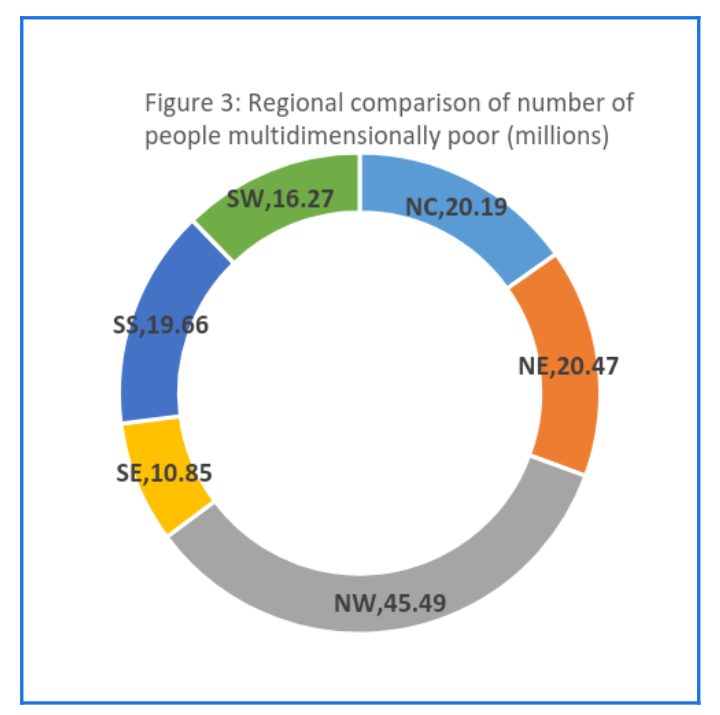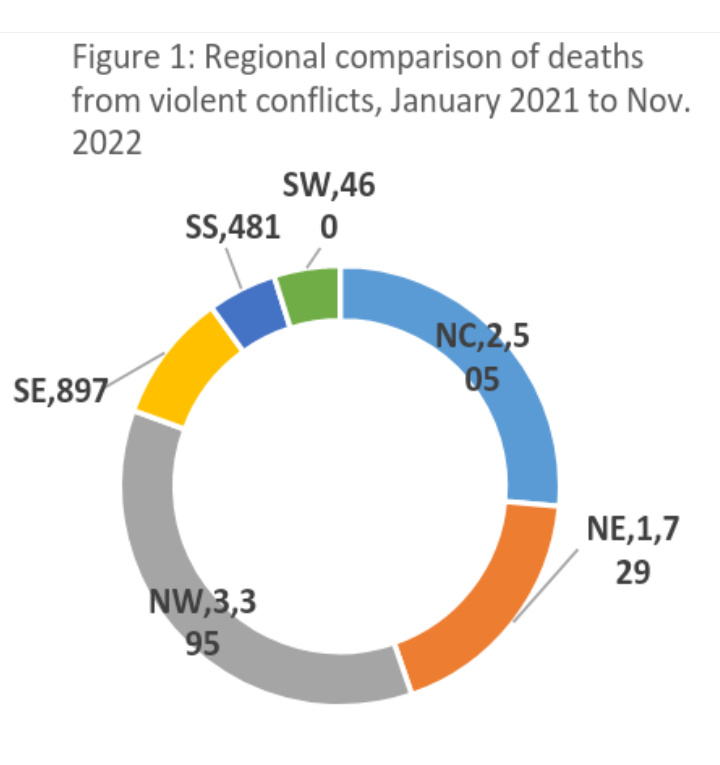By Chukwuma Okoli & Ndu Nwokolo
The northwestern region of Nigeria is bearing a double burden of violent conflict and alarming multidimensional poverty. The multidimensional poverty in Nigeria (2022) report published by the National Bureau of Statistics (NBS) paints an alarming picture of multidimensional poverty in the region. The report reveals that the Northwest region is home to the highest number of people who are multi-dimensionally poor in the country, accounting for 34.2 per cent or 45.49 million of the 132.92 million multi-dimensionally poor people in Nigeria (see figure 3). Meanwhile, the Northwest region has also been a hotbed of violent conflicts. The region is afflicted by various violent conflicts such as banditry, terrorism, farmers-herders clash, etc.
Data from Nextier Violent Conflict Database shows that between January 2021 and November 2022, 3,395 lives were lost due to various violent conflicts in the Northwest (see figure 1). Again, 3,134 persons were kidnapped in the region within the same period – the highest compared to other regions in the country (see figure 2). The unprecedented attack of the train travelling from Abuja to Kaduna by bandits in March 2022 signposted the level of banditry in the Northwest. Existing studies have demonstrated a bi-directional relationship between conflict and poverty. Terms such as ‘conflict trap’ and ‘conflict debt’ have been used to explain the vicious cycle of conflict and poverty. There is compelling evidence that most of the world’s poor today are in regions afflicted by violent conflicts. By 2030, it is projected that between 43 per cent and 80 per cent of the world’s extremely poor will live in conflict-affected communities. This edition of Nextier SPD Policy Weekly reflects the nexus between violent conflict and the alarming multidimensional poverty in Northwest Nigeria.

EXPLAINING THE VICIOUS CIRCLE OF VIOLENT CONFLICT AND MULTIDIMENSIONAL POVERTY IN NORTHWEST NIGERIA
In their recent study ‘Conflict and Poverty’, Mueller and Techasunthornwat (2020) demonstrated the nexus between conflict and poverty by showing that conflict undermines economic performance through the direct destruction of resources that would have been deployed for production. Conflict also deepens insecurity in transport, spreading violence costs beyond the territory affected by conflict. Again, post-conflict humanitarian crisis and contraction of investment due to instability coalesce to deepen poverty in conflict-affected communities. The thesis of Mueller and Techasunthornwat facilitates an understanding of the vicious circle of violent conflict and multidimensional poverty in Northwest Nigeria. The violent conflict in the Northwest is also multidimensional and expressed in banditry, terrorism, farmers-herders clashes and kidnapping. Banditry is the most vicious conflict in the Northwest, where thousands of bandits are involved in various forms of criminality and violence, such as cattle rustling, illicit gold mining, maiming of innocent souls, kidnapping and gender-based violence (Rufa’I, 2021). Data from the Nextier Violent Conflict Database shows that banditry led to 3,206 deaths in Northwest Nigeria between January 2021 and November 2022 alone.
Banditry has undermined economic activities and sources of livelihood in the Northwest through the attacks on farm settlements which has led to the death and displacement of many farmers, some of whom have abandoned their farms due to fear of bandits. Round 8 of the displacement report by the International Organization for Migration (IOM) shows that 531,278 were internally displaced in five states of the Northwest as of October 2021, mainly due to violent conflicts in the region. The disruption of farming and displacement of the populace have contributed to the problem of food security in the Northwest. At least 1.6 million people were estimated to be food insecure in the three Northwest states of Katsina, Sokoto and Zamfara between March and May 2021. Katsina state had the highest number of food insecure people (1 million), followed by Zamfara (537,000) and Sokoto states (138,000). Food insecurity is a major contributor to multidimensional poverty in the Northwest. The 2022 multidimensional poverty report by the NBS shows that food insecurity and nutrition were among the top five contributors to multidimensional poverty in the Northwest. Together food insecurity and nutrition contributed 21.4 per cent to multidimensional poverty in the region.
Banditry in the Northwest has impacted education negatively, thereby undermining human capital development. As Mueller and Techasunthornwat (2020) noted, children’s exposure to conflict imposes the heaviest conflict debt because “If conflict prevents children from building their human capital … then past conflict should be related to poverty rates today.” As a result of violent conflicts in the Northwest, school children have been kidnapped. In 2019, bandits abducted six schoolgirls and two teachers after raiding a private secondary school in Kaduna State. Similarly, in 2021 gunmen attacked Bethel Baptist school in Kaduna, where over a hundred students were kidnapped. Over 1,000 students have been abducted by bandits in various attacks on schools or colleges across Northwest since 2020. In some instances, the government has deliberately shut down schools for fear of bandits’ attack. In 2021, state officials in Zamfara state ordered schools across the state to close to prevent further attacks by bandits. These disruptions in education in the Northwest have contributed to the growing poverty in the region.
The 2022 Multidimensional Poverty Report by the NBS shows that deprivation arising from not attending school (school attendance) is the single largest contributor to multidimensional poverty in the Northwest, contributing 13.4 per cent of the multidimensional poverty in the region. As rightly noted by Mueller and Techasunthornwat (2020, p. 2): “Armed conflict affects the productivity of the workforce in the long run through lack of education.” Violent conflicts rob the North region of education opportunities and manpower development, thereby undermining the productivity of the workforce in the region.
STRATEGIES FOR ADDRESSING VIOLENT CONFLICT AND MULTIDIMENSIONAL POVERTY IN NORTHWEST NIGERIA
Based on the causal relations between conflict and multidimensional poverty in the Northwest, the following recommendations are put forward to address drivers of multidimensional poverty while reducing violent conflicts.
Deepen peacebuilding projects: State and non-state actors should deepen the implementation of peacebuilding projects in the region. The peacebuilding projects should target root drivers of conflict, such as the struggle over natural resources such as land, water and gold. This would go a long way in reducing intergroup clashes which engender displacement and poverty.
Speedy rehabilitation of farmers displaced by violent conflict and natural disasters: Farmers displaced by violent conflict and natural disasters such as flood and desertification should be adequately rehabilitated by state and non-state development partners to ensure that such farmers return to their source of livelihood and contribute to food production in the region. This would reduce food insecurity, a key indicator of multidimensional poverty afflicting the Northwest.
Prioritise the security of schools and the safety of students: The state government, in collaboration with security agencies and local communities, should prioritise the security and safety of students at all levels of educational institutions. Schools should be properly fenced with adequate surveillance of the school environment provided by the security agencies, who should establish information-sharing channels with the local communities for intelligence sharing.
Poverty reduction programmes that take note of fragility in the region: The state governments in the Northwest should partner with development partners and credible experts to design and kick-start poverty reduction programmes that take note of the fragility in the region. The poverty reduction programme should not just aim at reducing poverty but build mechanisms that reduce the vulnerability of the poor to violence, either as victims or actors.
Support resilience and cohesion in communities affected by conflict: State and non-state actors should support local communities, particularly farming, on strategies to build resilience and cohesion in conflict and post-conflict settings. This would reduce shocks, vulnerabilities and impacts of violent conflict on the livelihood of the communities.
* POLICY RECOMMENDATIONS
1. State and non-state actors should deepen the implementation of peacebuilding projects in the region.
2. Farmers displaced by violent conflict and natural disasters such as floods and desertification should be adequately rehabilitated by state and non-state development partners.
3. The state government, in collaboration with security agencies and local communities, should prioritise students’ security and safety at all educational institutions.
4. The state governments in the Northwest should partner with development partners and credible experts to design and kick-start poverty reduction programmes.
5. State and non-state actors should support local communities, particularly farming, on strategies to build resilience and cohesion in conflict and post-conflict settings.
CONCLUSION
Conflict and poverty are mutually reinforcing vices. This is reflected in Northwest Nigeria, which is afflicted by different forms of violent conflict and is also home to the country’s highest number of multi-dimensionally poor persons. The violent conflict in Northwest Nigeria has deepened multidimensional poverty and frustrated recovery through the destruction of means of livelihood, particularly farming in the region. The conflict has also undermined human capacity development and productivity through the onslaught on the educational system by bandits who constantly raid schools to kidnap students and teachers, thereby slowing down progress in education. There is an urgent need for state and non-state actors to implement programmes aimed at simultaneously addressing drivers of multidimensional poverty while reducing violent conflicts in the region.
(Dr. Okoli is an Associate Consultant at Nextier SPD and a Lecturer at the Department of Political Science, Nnamdi Azikiwe University, Awka, Nigeria; while Dr. Ndubuisi Nwokolo is a Managing Partner and Chief Executive at Nextier SPD)


